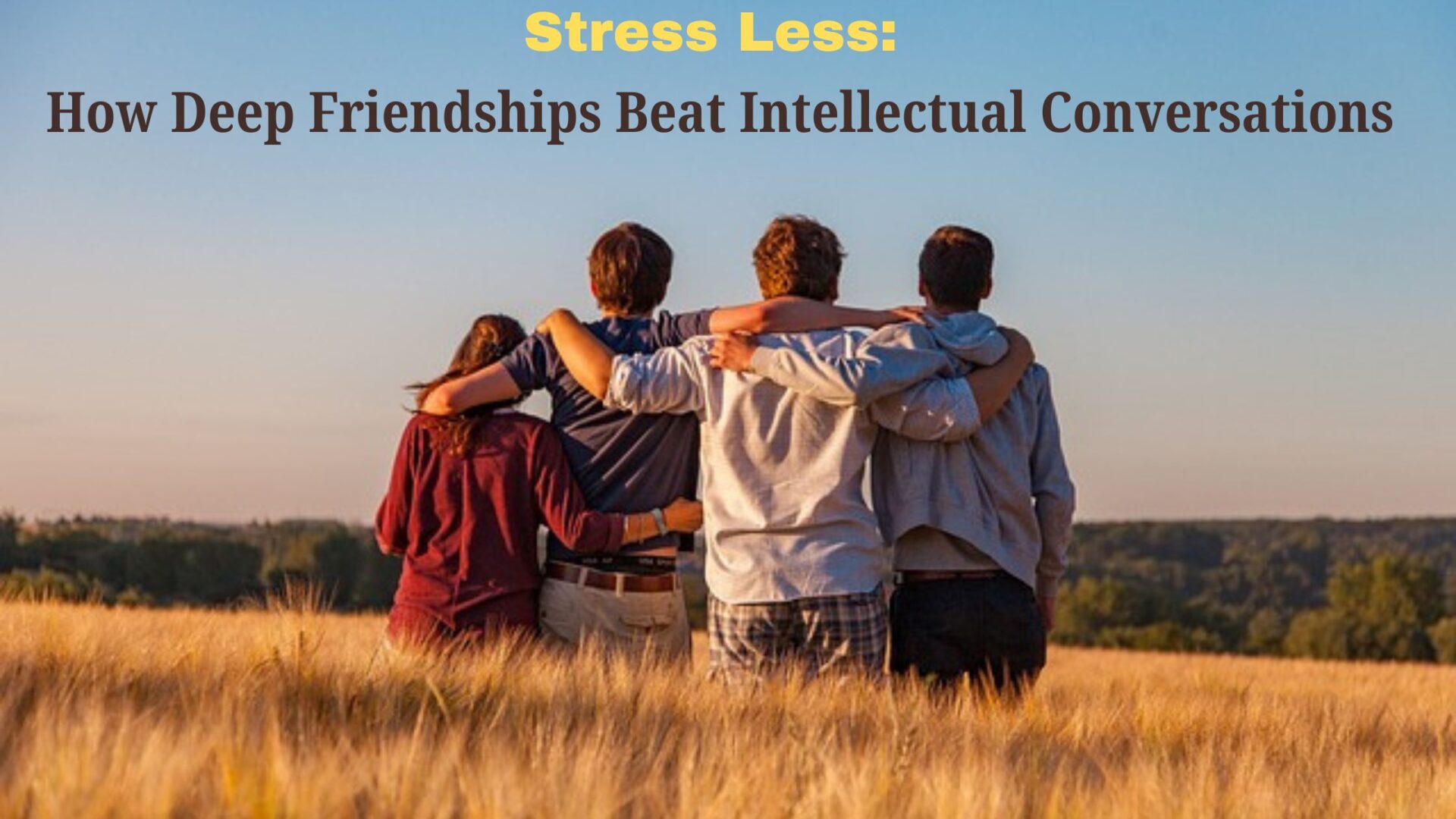Introduction:
Stress Less: How Deep Friendships Beat Intellectual Conversations

Deep friendships offer a profound and lasting impact on well-being compared to intellectual conversations. They provide understanding, emotional support, shared experiences, authenticity, and resilience, reducing stress levels and fostering a sense of peace.
Practical Tips for Cultivating Deep Friendships
To harness the stress-relieving power of deep friendships, it’s essential to invest time and effort into building and maintaining these relationships. Here are some practical tips:
- Be Present: Make time for your friends and be fully present during your interactions. Put away distractions and focus on truly connecting.
- Listen Actively: Show genuine interest in your friends’ lives by listening actively and empathetically. Ask questions and be curious about their experiences.
- Share Openly: Don’t be afraid to share your thoughts and feelings. Vulnerability can strengthen bonds and encourage deeper connections.
- Be Supportive: Offer support and encouragement during tough times. Let your friends know that you are there for them, no matter what.
- Create Shared Experiences: Engage in activities that you both enjoy. Whether it’s a hobby, a trip, or a simple get-together, shared experiences can deepen your bond.
What are the benefits of deep friendships for mental health?
Deep friendships offer several significant benefits for mental health, including:
- Emotional Support: Close friends provide a safe space to express feelings and emotions, which can help reduce stress and anxiety. Having someone to talk to during tough times can be incredibly comforting.
- Reduced Feelings of Loneliness: Deep friendships help combat loneliness, which is linked to depression and other mental health issues. Knowing there are people who care about and understand you can be very reassuring.
- Increased Sense of Belonging: Being part of a close-knit group of friends fosters a sense of community and belonging, which is essential for mental well-being. This sense of belonging can boost self-esteem and confidence.
- Improved Coping Skills: Friends can offer different perspectives and advice, helping you develop better coping mechanisms. They can provide practical solutions to problems and emotional support, making it easier to navigate life’s challenges.
- Positive Influence on Behavior: Good friends can encourage healthy behaviors, such as regular exercise, proper nutrition, and avoiding harmful habits. They can also motivate you to pursue your goals and interests.
- Enhanced Life Satisfaction: Having strong friendships can contribute to a greater overall sense of happiness and life satisfaction. Sharing experiences and creating memories with friends can bring joy and fulfillment.
- Stress Reduction: Engaging in fun and relaxing activities with friends can reduce stress levels. Laughter and enjoyment with friends trigger the release of endorphins, which are natural mood lifters.
- Support in Personal Growth: Friends can provide valuable feedback and support personal growth and self-improvement. They can challenge you to step out of your comfort zone and achieve your potential.
Overall, deep friendships are a crucial component of a healthy, balanced life, offering numerous psychological and emotional benefits that contribute to overall mental well-being.
What is the impact of emotional support from friends on stress management?
Emotional support from friends has a significant impact on stress management. Here are several ways in which it helps:

- Reduction of Stress Levels: Emotional support from friends can lower stress levels by providing a sense of comfort and reassurance. When you share your worries and concerns with friends, it can lighten the emotional load, making stress more manageable.
- Improved Coping Mechanisms: Friends can offer different perspectives and advice on dealing with stress, helping you develop effective coping strategies. They can provide practical solutions and emotional support, making it easier to navigate stressful situations.
- Emotional Outlet: Having friends to talk to provides an outlet for expressing emotions, which can prevent the build-up of stress. Venting feelings and thoughts can be cathartic and prevent stress from escalating.
- Distraction and Relaxation: Spending time with friends can serve as a distraction from stressors. Engaging in enjoyable activities and socializing can provide a break from stress and promote relaxation.
- Increased Resilience: Emotional support from friends can increase your resilience to stress. Knowing you have a support system can make you feel more capable of handling challenges, which reduces the overall impact of stress.
- Boosted Mood: Friends can lift your spirits through humor, companionship, and positive interactions. This boost in mood can counteract the negative effects of stress and promote a more positive outlook.
- Validation and Understanding: Friends can provide validation and understanding, making you feel heard and supported. This validation can reduce feelings of isolation and helplessness that often accompany stress.
- Encouragement and Motivation: Friends can offer encouragement and motivation to face and overcome stressful situations. Their support can help you stay focused and determined, reducing the sense of being overwhelmed.
- Healthier Lifestyle Choices: Friends can encourage healthy behaviors such as regular exercise, proper nutrition, and adequate sleep, which are essential for managing stress. A healthy lifestyle can mitigate the physical effects of stress on the body.
Overall, emotional support from friends is a vital component of effective stress management. It provides psychological and emotional resources that help buffer the negative effects of stress and promote overall well-being.
Why are deep friendships more comforting than intellectual conversations?
Deep friendships are often more comforting than intellectual conversations due to several key factors:

- Emotional Connection: Deep friendships are built on emotional bonds, trust, and mutual understanding. This emotional connection provides a sense of safety and comfort that goes beyond the intellectual stimulation of a conversation.
- Unconditional Support: Friends in deep relationships offer unconditional support and acceptance. They are there for you regardless of the circumstances, providing a reliable source of comfort in times of need.
- Shared Experiences: Deep friendships are often formed through shared experiences and memories. This history creates a strong bond and a sense of familiarity that can be incredibly comforting.
- Empathy and Understanding: Close friends have a deeper understanding of your emotions, personality, and life circumstances. Their empathy allows them to provide support that is tailored to your specific needs, making it more comforting.
- Non-Judgmental Space: In deep friendships, there is usually an unspoken agreement of non-judgment. Friends accept you for who you are, which creates a safe space where you can express yourself freely without fear of criticism.
- Emotional Validation: Deep friendships provide emotional validation, helping you feel understood and acknowledged. This validation can be more comforting than intellectual recognition or agreement.
- Physical Presence and Affection: Physical presence, touch, and affection play a significant role in providing comfort. A hug, a hand on the shoulder, or just being physically present with a friend can offer a level of comfort that intellectual conversations cannot match.
- Stress Relief: Being with close friends often involves relaxing activities, laughter, and enjoyment, which can significantly reduce stress and provide comfort. Intellectual conversations, while stimulating, may not offer the same level of stress relief.
- Loyalty and Reliability: Deep friendships are characterized by loyalty and reliability. Knowing that you can depend on your friends during tough times provides a profound sense of security and comfort.
- Holistic Support: Deep friendships provide holistic support that addresses emotional, psychological, and sometimes even practical needs. Intellectual conversations typically focus on the exchange of ideas and knowledge, which may not fully address emotional and psychological needs.
In summary, deep friendships offer a multifaceted form of support that combines emotional, physical, and psychological comfort. This comprehensive support system is often more comforting than the intellectual stimulation of conversations alone.
Conclusion
In the quest to reduce stress, don’t underestimate the power of deep friendships. While intellectual conversations have their place, it’s the authentic, supportive, and joyful connections with true friends that can provide the most significant stress relief. By nurturing these relationships, you’ll not only stress less but also enrich your life in countless ways. So, take the time to cultivate and cherish your deep friendships – your mental and emotional well-being will thank you.
References
- Holt-Lunstad, J., Smith, T. B., & Layton, J. B. (2010). Social Relationships and Mortality Risk: A Meta-analytic Review. PLoS Medicine, 7(7), e1000316. Link
- House, J. S., Landis, K. R., & Umberson, D. (1988). Social Relationships and Health. Science, 241(4865), 540-545. Link
- Cohen, S., & Wills, T. A. (1985). Stress, Social Support, and the Buffering Hypothesis. Psychological Bulletin, 98(2), 310-357. Link
- Umberson, D., & Montez, J. K. (2010). Social Relationships and Health: A Flashpoint for Health Policy. Journal of Health and Social Behavior, 51(Suppl), S54-S66. Link
- Brown, S. L., Nesse, R. M., Vinokur, A. D., & Smith, D. M. (2003). Providing Social Support May Be More Beneficial Than Receiving It: Results from a Prospective Study of Mortality. Psychological Science, 14(4), 320-327. Link
